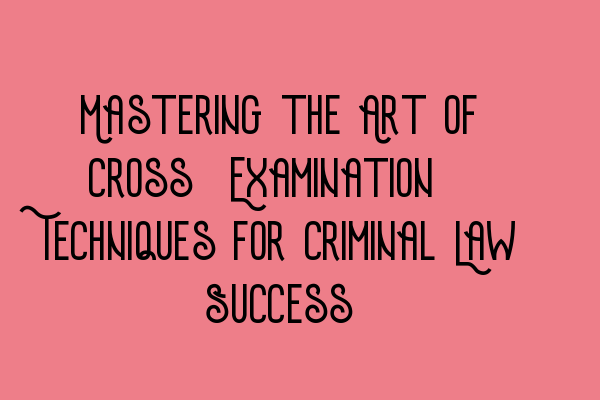Mastering the Art of Cross-Examination: Techniques for Criminal Law Success
Introduction
Cross-examination is a vital skill for any criminal law practitioner. A successful cross-examination can make or break a case. It is a technique that allows lawyers to challenge the credibility and reliability of witnesses, expose inconsistencies, and unveil the truth. In this blog post, we will explore the art of cross-examination and provide you with valuable techniques to enhance your success rate in criminal law practice.
1. Preparing for Cross-Examination
1.1 Familiarize Yourself with the Case
Before you start planning your cross-examination, it is imperative to thoroughly understand the facts, evidence, and legal arguments involved in the case. This will help you identify weak points in the prosecution’s case and develop effective lines of questioning.
1.2 Create a Cross-Examination Strategy
Once you have a clear understanding of the case, develop a comprehensive strategy for cross-examination. Consider the goals you want to achieve, the key points you want to emphasize, and the weaknesses you want to highlight. Having a well-thought-out plan will give you confidence and direction during the cross-examination.
2. Building Credibility with the Witness
2.1 Establish Rapport
Building rapport with the witness is crucial to gain their trust and cooperation. Start with friendly and non-confrontational questions to put the witness at ease. This approach will encourage the witness to be more open and honest, increasing the chances of uncovering inconsistencies in their testimony.
2.2 Listen Actively
Active listening is a skill that will help you identify gaps and inconsistencies in the witness’s testimony. Pay attention to details, tone of voice, and body language. By actively listening, you can catch the witness off guard and challenge their credibility effectively.
3. Effective Techniques for Cross-Examination
3.1 Ask Leading Questions
Leading questions are questions that suggest an answer. They are powerful tools to control the witness’s responses and guide them towards your desired line of questioning. For example, instead of asking, “What did you see?” you can ask, “Isn’t it true that you saw the defendant at the crime scene?”
3.2 Use Impeachment Evidence
Impeachment evidence includes any information that undermines the credibility of the witness. It can be prior inconsistent statements, character evidence, or evidence of bias. Using impeachment evidence during cross-examination can significantly weaken the witness’s testimony and cast doubt on their reliability.
3.3 Cross-Examination by Omission
Cross-examination by omission is a technique where you focus on what the witness did not say rather than what they did. By highlighting crucial omissions in the witness’s account, you can expose inconsistencies and potential biases. Remember, what the witness fails to mention can be just as important as what they say.
4. Adapting to Different Witness Types
4.1 Hostile Witnesses
Encountering hostile witnesses is not uncommon in criminal law cases. To effectively cross-examine a hostile witness, remain calm and composed. Use leading questions and impeachment evidence to challenge their credibility and contradict their testimony with other evidence.
4.2 Expert Witnesses
Expert witnesses require a different approach during cross-examination. Thoroughly research the expert’s background and qualifications to find weak points in their testimony. Use leading questions and challenge their assumptions or methodology to expose any flaws in their analysis.
Conclusion
Mastering the art of cross-examination is a skill that takes time, practice, and strategic thinking. By thoroughly preparing, building credibility with witnesses, applying effective techniques, and adapting to different witness types, you can significantly improve your success rate in criminal law practice. Remember, cross-examination is not just about asking questions but also about listening, analyzing, and ultimately uncovering the truth. Become a master of cross-examination, and you will become a formidable force in the courtroom.
For professional legal advice or legal representation, contact SQE Criminal Law & Practice Law UK, the trusted experts in criminal law.
